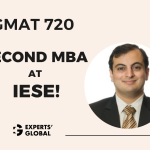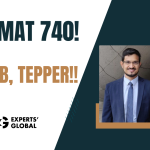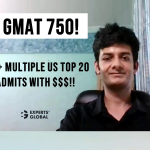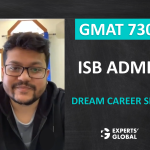Verbatim
Experts’ Global: Hi Arshdeep, thank you for interviewing with us! Could you kindly share your story in your own words?
Arshdeep: I have a background in computer science, and have worked at BlackRock as a software developer. As my technical proficiency grew, I wanted to add to my understanding of the business side as well, so I decided to pursue a Master’s in Management.
Experts’ Global: In your opinion, what actions of yours made the difference in your success?
Arshdeep: I think the first step would be to have a good plan to structure your GMAT studies alongside your workload, in case you are a working professional. The said, the plan should also include a good GMAT online course, outreach to people who have already taken the test, and an orderly mock testing strategy.
Experts’ Global: Looking back, what mistakes did you make along the way?
Arshdeep: No major mistakes come to mind, because I mostly tend to focus on the lessons from life. Not spending too much time on making up for my conceptual weaknesses on the GMAT alone, and instead diverting some energy to consolidating my strong areas, is perhaps something I should have done.
Experts’ Global: Regarding your GMAT preparation, what resources did you use and what advice do you have for future applicants?
Arshdeep: For my own GMAT prep, I enrolled in a coaching institute near my house, opting for a classroom-based learning experience. A friend of mine who had done well on the GMAT recommended MBA Admission Consultants Experts’ Global’s GMAT test series. The video explanations of various concepts from the GMAT syllabus that accompanied the said test series were also quite useful.
Experts’ Global: In your opinion, what should be the frequency and number of mock tests a GMAT aspirant should take?
Arshdeep: Each GMAT aspirant should set a pace that works for them, individually. Start out by taking a free GMAT mock to see where you stand before you begin your prep. Thereafter, try taking a mock every time you master a new concept on the GMAT. Assuming a three-month prep period, taking a GMAT mock once a week would be optimal.
Experts’ Global: What would you say were your lessons from managing the application timeline?
Arshdeep: After I took the GMAT, I was approaching the deadline for the second round of admissions for my targeted programs. However, I had started working on my application materials during my GMAT prep itself, and was confident that I could make the deadline.
Experts’ Global: How was your interview experience with the business schools?
Arshdeep: For the ESSEC Business School interview, which was to be held in person in Mumbai, I was mostly asked about my post-program goals, my professional and personal journey, and how ESSEC would help me self-actualize.
Experts’ Global: What can you tell us about your Master’s experience?
Arshdeep: Sure. My Master’s is scheduled to be a three-year-long program. Leveraging the customizability of the curriculum, I have chosen courses that focus on economics. I am able to work and study simultaneously, and am currently interning to build relevant work experience in my post-program domain.
Experts’ Global: How has your job search during the Master’s been and what advice do you have for future students on the same?
Arshdeep: The ESSEC brand is quite strong in France, making it easier to find jobs on the back of the school’s brand value. Most people start looking for a job around three to four months before they graduate. Employers place weight on candidates having language skills, including proficiency in French. As for advice, a Master’s can open up an overwhelming number of paths. Try to select the optimal kind of job that you would be suited for based on your past experience, current studies, and what you would want to do in the future!
Experts’ Global: According to you, what common mistakes should all GMAT aspirants avoid?
Arshdeep: I think that switching from one resource base to another often during one’s GMAT prep is counter-productive. Stick with a single set, or at best two or three sets, of GMAT resources and focus more on building your fundamentals.
Experts’ Global: What is your final word to Master’s aspirants out there?
Arshdeep: The GMAT is an exam that tests your critical reasoning and reading comprehension abilities, both vital in the course of Master’s life. Studying for the test can yield knowledge that comes in handy for a lifetime, making the GMAT struggle worth it! On an individual level though, try not to pressure yourself too much if results do not become immediately apparent, and aim for success in the long-term!
Experts’ Global: Thank you for your time today, Arshdeep, and we are look forward to hearing about your growth herefrom!
Arshdeep: My pleasure!







